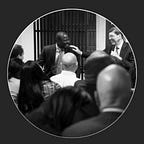Innovation > Infrastructure. America’s Tudor and Nigeria’s Dangote would agree.
Lack of investments in roads, rail, ports, electricity, water, sanitation, education, and other expensive infrastructure projects are often blamed for Africa’s poor business climate and development prospects. Understandably, because there is a high correlation between rich countries and good infrastructure, policy makers pursue big infrastructure projects and investors are skeptical to invest in regions with poor infrastructure. Multiple reports like this World Bank Summary Fact Sheet state how improving Africa’s poor infrastructure would increase GDP growth significantly. This causes massive infrastructure projects to be pursued even though, as University of Oxford scholar Bent Flyvbjerg points out, nine in ten projects exceed their cost estimates.
Is infrastructure truly at the core of development? Does it cause economic development? Which comes first — Infrastructure or market creating innovations? And if the answer is innovation, how should entrepreneurs deal with infrastructural challenges? Let us consider what one entrepreneur did when faced with infrastructural challenges that would rival any poor country today.
What country is this?
Life expectancy — 35 years; Per capita income — $1,200; Percent population with access to safe water and sanitation — <10%; Percent road penetration in country — <10%; Percent of income spent on food — 40%.
Whenever I ask people what region of the world the above statistics represent, they always say, with confidence, “a country in Africa”. Then I say — this is the United States of America, circa 1800s. It was in these circumstances that Frederic Tudor, also known as the Ice-King, built an industry that would be worth billions of dollars.
Tudor’s vision was to democratize access to ice for the average American, a hallmark of a market creating innovation. During his time only the rich had access to ice for preserving their foods and cooling their drinks. Ice and cold drinks were luxuries then as they still are for at least a couple billion people in the world today.
While Tudor could make money supplying ice to the rich, his vision led him to improve the ice-cutting, ice-storage, and ice-transportation technologies used at the time so he could drastically reduce the cost of production. He also had to market the ice to new American consumers because the average American was unsure what to do with ice. In fact, according to Refrigeration Nation, a book by Jonathan Rees, Tudor gave free ice to taverns for a year because he believed once people drank beer cold; they would never want it any other way. Tudor’s technological and business model innovations worked.
In the span of 40 years, the ice trade in New York City grew to revenues of more than $1.4 billion a year and the United States was exporting more than $700 million of ice annually, in today’s dollars. Tudor succeeded in building an industry that was worth billions of dollars and that employed thousands of people — ice cutters, transporters, storage men, ice-delivery men, construction workers, sales and marketing staff, accounting, ice-box manufacturers, and a host of other suppliers. Tudor’s innovations also enabled more efficient inter-state transportation of meat and other perishables in the United States, ultimately reducing the cost of food. In these difficult circumstances, Tudor thrived.
In no way does Tudor’s success suggest that infrastructure is unimportant for business and development. It is important. But it does illustrate that investors and entrepreneurs can succeed even in the most difficult of circumstances where basic infrastructure is non-existent. Aliko Dangote, Africa’s richest man and one of the world’s richest men, is a perfect example of an entrepreneur thriving in a very difficult environment. Dangote started his company about four decades ago and has since built it to become an African powerhouse.
Faced with poor infrastructure, entrepreneurs will have to integrate some of the most basic of things. Dangote provides his own power at some of his facilities. At the Forum for Growth and Innovation, we study the theory of interdependence and modularity. This theory states that if an interface that connects two components in a system is specifiable, verifiable, and predictable, then different players can (and probably should) build the modular components. If the interface is not specifiable, verifiable, or predictable, then a single entity has to build an interdependent system in order to maximize its performance.
An example that should resonate with many Africans is the use of generators for electricity. Because the electricity supply from the power companies (the interface through which we receive power electricity in our homes) in most African countries is unpredictable and unspecifiable, the rich in those societies use generators. Home owners therefore build an interdependent system because they cannot rely on the electricity company.
Until the power companies produce electricity predictably, home owners will continue to create the interdependent system by purchasing generators. While this increases the cost, if innovators focus on unfulfilled demand like Tudor and Dangote, they can build successful businesses in difficult environments.
Innovating in these circumstances is difficult as Tudor’s story and Dangote’s comments show. Entrepreneurs must understand the limitations of infrastructure and modify their innovations accordingly. But it is possible. In my next post, I write about a Nigerian banker turned fish-farmer in Ogun state, Nigeria. He deals with infrastructural challenges, but this has not stopped him from growing his fish farm into a very profitable enterprise. He says it was the best decision, personal and professional, he ever made. Who knows, maybe he too will build a multi-billion dollar business in Nigeria.
One does not need to ask Tudor or Dangote if they agree that innovation > infrastructure. Simply study what they have accomplished.
